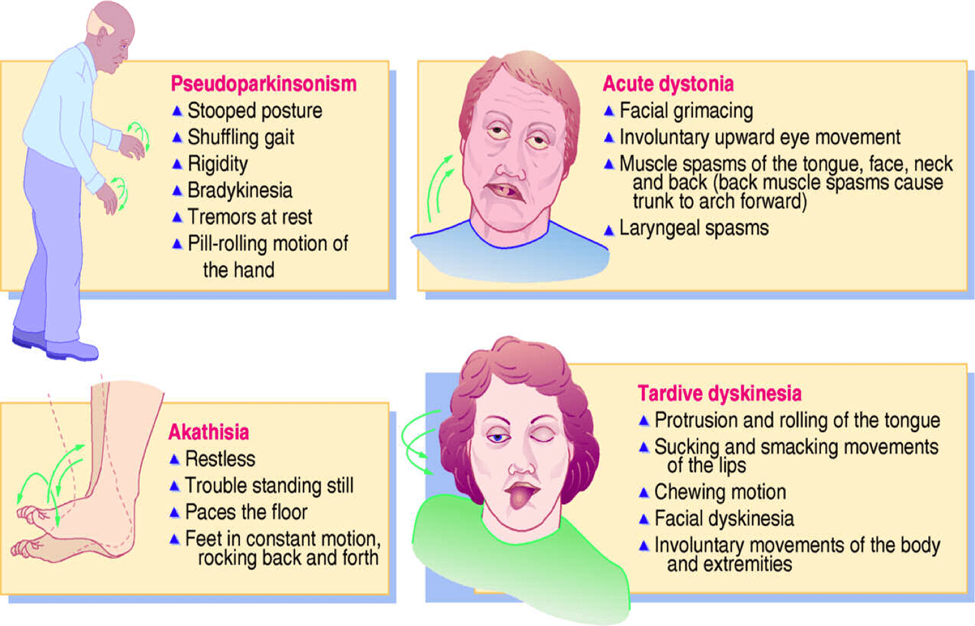A client diagnosed with schizophrenia, who has been taking antipsychotic medication for the last 5 months, presents in an emergency department (ED) with uncontrollable tongue movements, stiff neck, and difficulty swallowing. The nurse would expect the physician to recognize which condition and implement which treatment?
Neuroleptic malignant syndrome, treated by discontinuing antipsychotic medications
Agranulocytosis treated by administration of clozapine (Clozaril)
Tardive dyskinesia treated by discontinuing antipsychotic medication
Headache treated by administration of Hydrochlorothiazide
The Correct Answer is C
A. Neuroleptic malignant syndrome, treated by discontinuing antipsychotic medications: The symptoms described (uncontrollable tongue movements, stiff neck, difficulty swallowing) are more indicative of tardive dyskinesia than neuroleptic malignant syndrome. Neuroleptic malignant syndrome is characterized by hyperthermia, autonomic dysregulation, altered mental status, and generalized muscle rigidity. Treatment involves discontinuing antipsychotic medications and supportive care.
B. Agranulocytosis treated by administration of clozapine (Clozaril): Agranulocytosis is a rare but serious side effect of clozapine, not a treatment for the symptoms described. The symptoms presented are more consistent with tardive dyskinesia.
C. Tardive dyskinesia treated by discontinuing antipsychotic medication: This is the correct answer. Tardive dyskinesia is a movement disorder characterized by involuntary and abnormal movements, including tongue protrusion and facial grimacing. It can result from long-term use of antipsychotic medications, and discontinuing or reducing the dose of the antipsychotic is a primary intervention.
D. Headache treated by administration of Hydrochlorothiazide: Hydrochlorothiazide is a diuretic used to treat conditions like high blood pressure and edema, not headache or the symptoms described, which are more indicative of tardive dyskinesia.

Nursing Test Bank
Naxlex Comprehensive Predictor Exams
Related Questions
Correct Answer is C
Explanation
A. Neuroleptic malignant syndrome, treated by discontinuing antipsychotic medications: The symptoms described (uncontrollable tongue movements, stiff neck, difficulty swallowing) are more indicative of tardive dyskinesia than neuroleptic malignant syndrome. Neuroleptic malignant syndrome is characterized by hyperthermia, autonomic dysregulation, altered mental status, and generalized muscle rigidity. Treatment involves discontinuing antipsychotic medications and supportive care.
B. Agranulocytosis treated by administration of clozapine (Clozaril): Agranulocytosis is a rare but serious side effect of clozapine, not a treatment for the symptoms described. The symptoms presented are more consistent with tardive dyskinesia.
C. Tardive dyskinesia treated by discontinuing antipsychotic medication: This is the correct answer. Tardive dyskinesia is a movement disorder characterized by involuntary and abnormal movements, including tongue protrusion and facial grimacing. It can result from long-term use of antipsychotic medications, and discontinuing or reducing the dose of the antipsychotic is a primary intervention.
D. Headache treated by administration of Hydrochlorothiazide: Hydrochlorothiazide is a diuretic used to treat conditions like high blood pressure and edema, not headache or the symptoms described, which are more indicative of tardive dyskinesia.

Correct Answer is D
Explanation
A. Enables the nurse to assign the appropriate Axis I diagnosis: Nurses typically do not assign Axis I diagnoses. Diagnosing mental health conditions is typically the responsibility of psychiatrists, psychologists, or other licensed mental health professionals. Nurses, however, play a crucial role in gathering information to contribute to the overall assessment process.
B. Enables the nurse to prescribe the appropriate medications: Nurses do not prescribe medications; that is the responsibility of physicians, nurse practitioners, or other prescribers. However, gathering client information is essential for providing accurate information to the prescriber, assisting in medication management, and monitoring for side effects.
C. Enables the nurse to modify behaviors related to personality disorders: While nurses can assist in the management of behaviors related to mental health conditions, the primary purpose of gathering client information is not to modify behaviors related to personality disorders. It is more about understanding the client's needs and tailoring care accordingly.
D. Enables the nurse to make sound clinical judgments and plan appropriate care: This is the correct answer. Gathering client information is a fundamental step in the nursing assessment process. It provides the necessary data for the nurse to make informed clinical judgments, identify health problems, and plan appropriate care interventions. It allows the nurse to understand the client's unique needs, preferences, and potential risks, leading to individualized and effective care planning.
Whether you are a student looking to ace your exams or a practicing nurse seeking to enhance your expertise , our nursing education contents will empower you with the confidence and competence to make a difference in the lives of patients and become a respected leader in the healthcare field.
Visit Naxlex, invest in your future and unlock endless possibilities with our unparalleled nursing education contents today
Report Wrong Answer on the Current Question
Do you disagree with the answer? If yes, what is your expected answer? Explain.
Kindly be descriptive with the issue you are facing.
